* You are viewing Posts Tagged ‘Communication’
James Brown
July 14, 2010
Conferences and Workshops, Events, Project Updates
Tags: Communication, Databases, Digitization, Europe, History of Science, Networks, Royal Society, Samuel Hartlib, Seventeenth Century, Union Catalogue
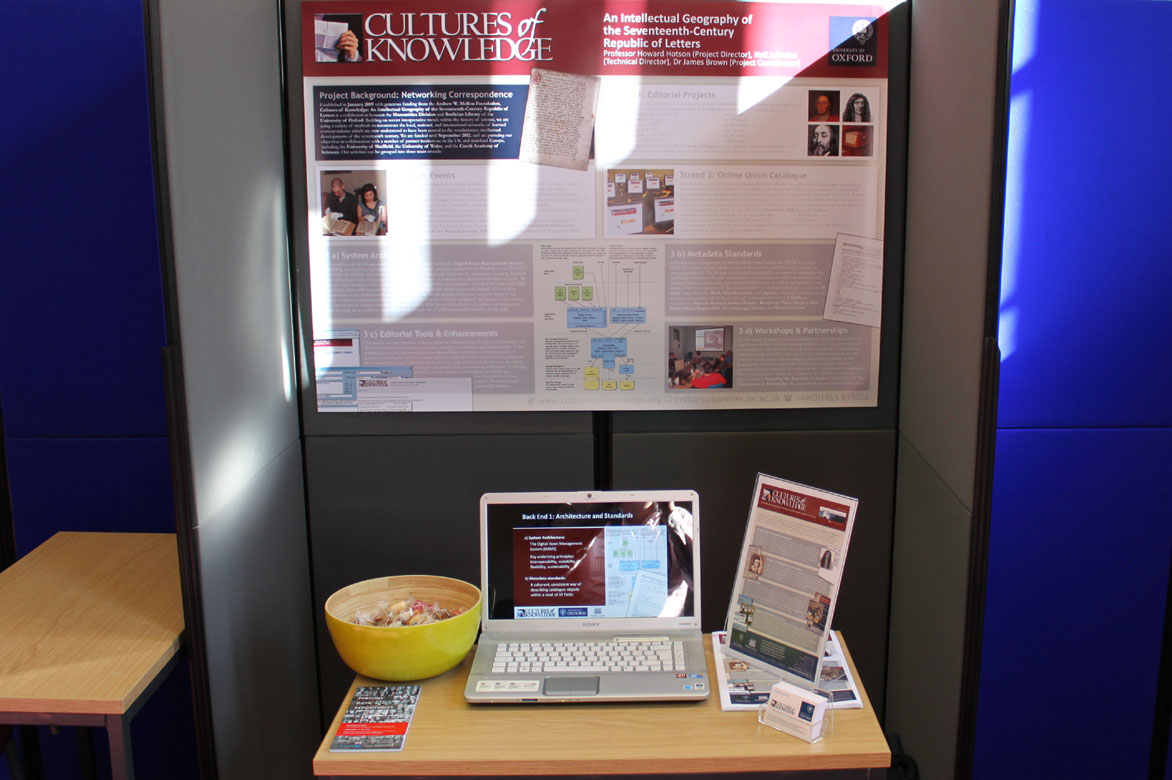
Our poster and stand at DH2010.
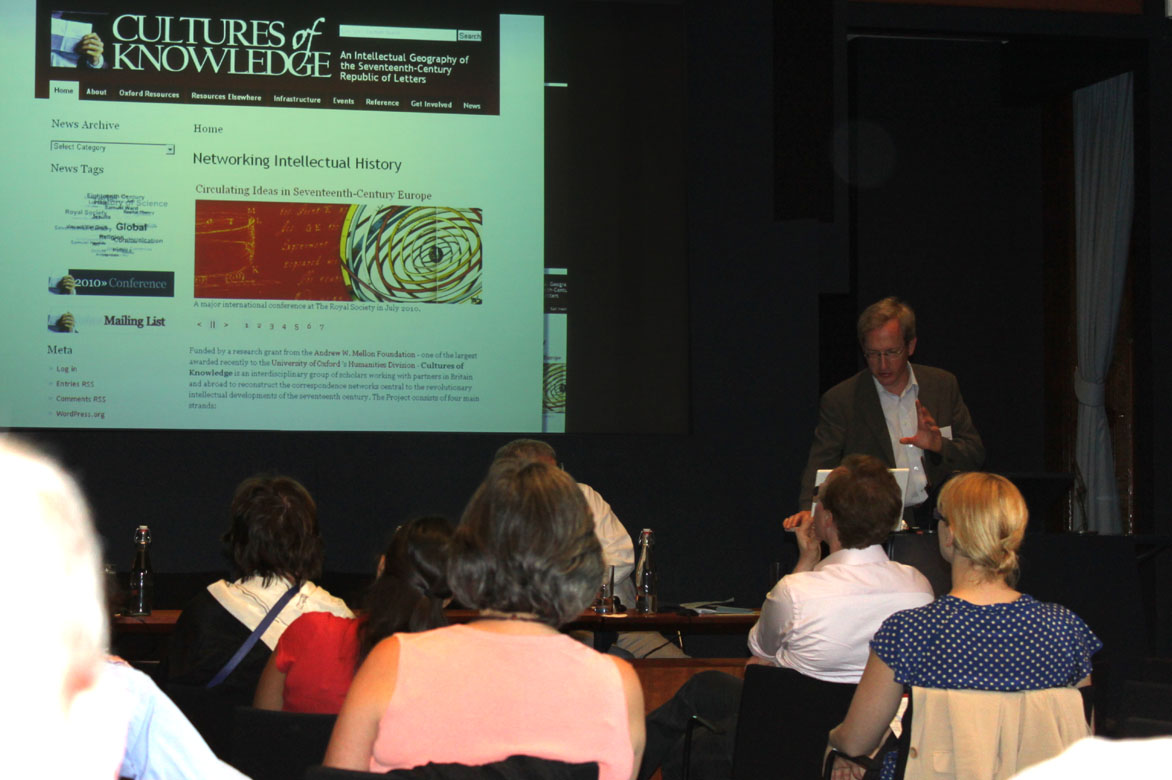
Presenting at the Royal Society.
Cultures of Knowledge headed to London last weekend as the Project Director and Coordinator braved thirty-degree metropolitan temperatures to share the Project’s research at two events. At Digital Humanities 2010, the flagship annual meeting of the digital humanities community hosted this year by King’s College London, we presented a poster, which focused mainly on our union catalogue and its technical underpinnings. We received very useful feedback and discovered and made connections with some highly complementary projects, including the initiative discussed below. Meanwhile, at the kind invitation of our collaborator Mark Greengrass, Howard Hotson co-delivered a keynote address at Circulating Ideas in Seventeenth-Century Europe: Networks, Knowledge, and Forms, a conference at the Royal Society organised by Ruth Connolly (University of Newcastle), Felicity Henderson (Royal Society), and Carol Pal (Bennington College). Building on Mark’s overview of Hartlib’s significance as an intelligencer and the trials and tribulations of the Hartlib Papers Project, Howard used a description of the place of Hartlib and his letters within Cultures of Knowledge as the basis for a more general overview of the Project and its aspirations, especially within the digital sphere.
Download the poster presented at DH2010
James Brown
June 09, 2010
Events, Lectures, Project Updates
Tags: Amsterdam, Antoinette Bourignon, Book History, Communication, Gender, Jan Amos Comenius, Low Countries, Networks, Religion, Seventeenth Century, Women
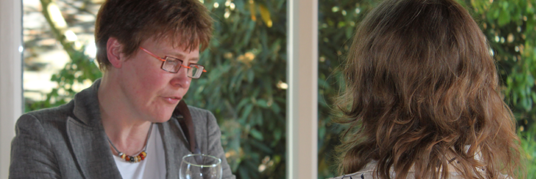
Discussions continue with Professor de Baar during the wine reception.
In the sixth installment of the Project’s seminar series on Thursday 3 June, Professor Mirjam de Baar (University of Groningen) described the epistolary practice and strategies of a seventeenth-century female prophet and mystic in a paper entitled ‘The Re-construction of a Spiritual Network: The Correspondence of Antoinette Bourignon (1616-1680)’. From her base in Amsterdam (where she purchased her own press in the late 1660s), Bourignon used a variety of textual media to disseminate the message that she was a spiritual leader – ‘The Mother’ – chosen by God to restore true Christianity on earth, and to consolidate a following around this ecumenical identity. Bourignon’s letters, argued de Baar, were central to this programme; over 600 manuscript versions survive (both originals and scribal copies), eleven different printed editions appeared during her lifetime, while nine further volumes were subsequently published posthumously. Her correspondents included luminaries such as Jan Amos Comenius (1592-1670), Robert Boyle (1627-1691), Jan Swammerdam (1637-80), and Pierre Poiret (1646-1719), as well as a wide range of socially diverse disciples who wrote to her seeking advice on a variety of spiritual and personal issues, and whose preoccupations and voices are anonymously reproduced in published responses. In consequence, her letters have a dialogic, polyphonous quality, while the same followers who wrote to her seeking guidance in turn represented an important market for the letters in their printed manifestations, suggesting a close relationship between epistolarity and the mechanics of early modern publishing, and the existence of a shrewd business model beneath the spiritual discourse (a point further underlined during subsequent discussion). Despite her failure to establish a long-term community on the island of Nordstrand, and the fact that in the later years of her life the suspicions of Lutheran clergy forced her into exile in Eastern Friesland, Bourignon maintained a prolific output of letters, and continued to combine the roles of spiritual leader, publisher of epistolary collections, and manager of what might be interpreted as a spiritually driven commercial enterprise. Seminars take place in the Faculty of History on George Street on Thursdays at 3pm. For future seminars in the series, please see here.
 Podcast now available on the seminar page!
Podcast now available on the seminar page!
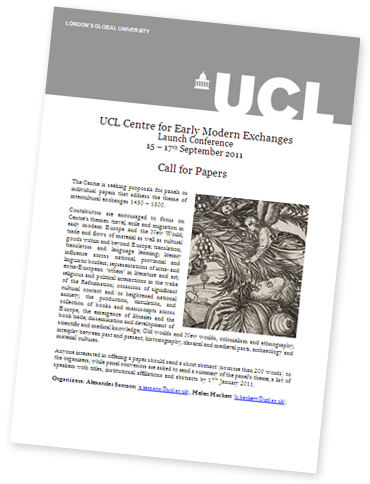 Contributions are sought for the launch conference of the recently established UCL Centre for Early Modern Exchanges, which will take place at UCL on 15–17 September 2011. Proposals for individual panels or papers should address aspects of intercultural exchanges 1450–1800, and ‘contributors are encouraged to focus on Centre’s themes: travel, exile and migration in early modern Europe and the New World; trade and flows of material as well as cultural goods within and beyond Europe; translation, translators and language learning; literary influence across national, provincial and linguistic borders; representations of intra- and extra-European ‘others’ in literature and art; religious and political interactions in the wake of the Reformation; occasions of significant cultural contact and/or heightened national anxiety; the production, circulation, and collection of books and manuscripts across Europe, the emergence of libraries and the book trade; dissemination and development of scientific and medical knowledge; Old worlds and New worlds, colonialism and ethnography; interplay between past and present, historiography, classical and medieval pasts, archaeology and material cultures’. The deadline for proposals is 17 January 2011; for full details, please see the conference webpage.
Contributions are sought for the launch conference of the recently established UCL Centre for Early Modern Exchanges, which will take place at UCL on 15–17 September 2011. Proposals for individual panels or papers should address aspects of intercultural exchanges 1450–1800, and ‘contributors are encouraged to focus on Centre’s themes: travel, exile and migration in early modern Europe and the New World; trade and flows of material as well as cultural goods within and beyond Europe; translation, translators and language learning; literary influence across national, provincial and linguistic borders; representations of intra- and extra-European ‘others’ in literature and art; religious and political interactions in the wake of the Reformation; occasions of significant cultural contact and/or heightened national anxiety; the production, circulation, and collection of books and manuscripts across Europe, the emergence of libraries and the book trade; dissemination and development of scientific and medical knowledge; Old worlds and New worlds, colonialism and ethnography; interplay between past and present, historiography, classical and medieval pasts, archaeology and material cultures’. The deadline for proposals is 17 January 2011; for full details, please see the conference webpage.
Applications are invited for an international PhD programme The Traditions of the Mediterranean Humanism and Challenges of our Times: The Frontiers of Humanity. Co-funded by the European Union, the programme is organised by the Institute for Interdisciplinary Studies ‘Artes Liberales’ at the University of Warsaw, and offers forty-eight months of paid fellowships across over a dozen thematic strands, including 12-18 months in Austria, the Czech Republic, France, Great Britain, Greece, Hungary, Macedonia, Russia, Spain, or the USA (at a stipend of about 770 euros per month, increased to 1,150 euros when abroad). Applicants to the strand Universal Reformation: Intellectual Networks in Early Modern Central Europe will explore major intellectual movements in early modern central Europe in the post-Reformation period, including correspondence networks and the transfer of knowledge due to the displacement of scholars and shifting local intellectual and religious traditions. As well as stays at the Centre for Early Modern Studies at the University of Aberdeen and the Institute of Philosophy at the Czech Academy of Sciences, this will comprise a six-month stay at the University of Oxford, where, via the Modern European History Research Centre, candidates will benefit from synergies with Cultures of Knowledge and be co-supervised by Project Director Professor Howard Hotson. The deadline for applications is 17 July 2010. For full details, please see the programme website.
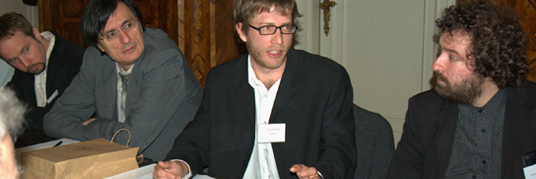
Workshop participants in discussion. © SOM
The third and final workshop in our extremely successful east-central European series took place last month in Budapest on the theme of ‘Encyclopaedism, Pansophia, and Universal Communication, 1560-1670′. The workshop was generously hosted and co-sponsored by Central European University and the Semmelweis Museum, Library, and Archives of the History of Medicine (with additional financial support from the Institute of Literary Scholarship of the Hungarian Academy of Sciences and the Institute for Literary Studies and Lingusitics of the University of Miskolc), and was organised by Márton Szentpéteri, Gábor Kecskeméti, Benedek Varga, and Márton Zászkaliczky. It allowed eighteen emerging and established scholars to converge on the related seventeenth-century ideas of collecting all knowledge into a single coherent system and of teaching all things to all men, as well as the networks and communicative strategies by which these universalist philosophies were disseminated across the fragmented geographical and political canvas of east-central Europe. For full details of the workshop, including abstracts and photographs, please see the workshop webpage. Themes addressed in the course of the workshop series will be drawn together in the international conference Universal Reformation: Intellectual Networks in Central and Western Europe, 1560-1670 (St Anne’s College, University of Oxford, 21-23 September).







 Join
Join 